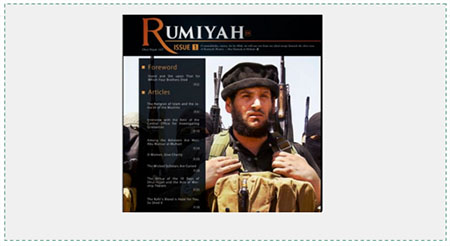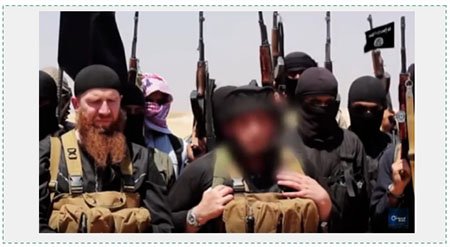
Abu Mohammad Al-Adnani, considered ISIS’s number 2 leader, commemorated in an article in ISIS’s new organ, Rumiyah (i.e., Rome, the capital of Christianity)
Overview
1. On August 30, 2016, the US Department of Defense announced the killing of Abu Mohammad Al-Adnani in an airstrike carried out by the US-led coalition near the town of Al-Bab, north of Aleppo. According to the announcement, Al-Adnani was one of the central figures in planning ISIS’s attacks abroad, in addition to being its spokesman. As part of his activity in planning ISIS’s attacks abroad, he was responsible for coordinating the movements of ISIS operatives and directly advocated carrying out attacks against civilians and military personnel from different countries. He was also responsible for recruiting ISIS operatives (US Department of Defense website, August 30, 2016).
2. The killing of Abu Mohammad al-Adnani represents another blow to ISIS, since he was considered its number 2 leader and the figure closest to ISIS leader Abu Bakr al-Baghdadi (Al-Adnani fought under Al-Baghdadi’s command against the US Army in Iraq before the establishment of ISIS). After the establishment of the Islamic Caliphate (2014), he enjoyed the status of a senior leader and held various positions whose nature was military-operational (terrorist attacks abroad), political (Al-Adnani was the one who announced the establishment of the Caliphate in June 2014), and propagandist (he was known for his calls on Muslims in the West to kill civilians in their home countries). Following Al-Adnani’s calls on Muslims, ISIS-inspired attacks were carried out in the West (see Appendix C).
3. During the past year, there has been an increase in the effectiveness of targeted killings of senior figures in ISIS, mainly by the United States and the coalition countries. These targeted killings, and battles on the ground, killed ISIS commanders at all levels, from top-ranking commanders to field commanders. A prominent military commander who died in a US airstrike in Iraq was so-called war minister Abu Omar al-Shishani (i.e., the Chechen)[1]. In effect, the killing of Abu Mohammad al-Adnani and Abu Omar the Chechen symbolize the elimination of ISIS’s senior command chain, which operated under the leadership of Caliph Abu Bakr al-Baghdadi and played a significant role in ISIS’s day-to-day activity. The killing has created a vacuum that Abu Bakr al-Baghdadi is now trying to fill[2].

Abu Mohammad al-Adnani (in the middle, with his face blurred) alongside Omar the Chechen (on the left). The two men appear in the video released by ISIS when the establishment of the Caliphate was announced (YouTube, June 29, 2014)
4. At this point, the identity of Abu Mohammad al-Adnani’s successor is unclear. However, it is doubtful whether his successor will enjoy the close proximity to ISIS’s leader and the many authorities wielded by Al-Adnani. In the ITIC’s assessment, these powers might be divided among various commanders from various disciplines (for example, the appointment of different people to hold positions at the operational-terrorist level and at the propaganda level). Due to the sensitive nature of the positions held by Al-Adnani, it is likely that the decision on this matter will be made by ISIS leader Abu Bakr al-Baghdadi[3].
|
5. The killing of Abu Mohammad al-Adnani is the latest in a number of systematic attacks against ISIS operatives in Syria and Lebanon – from top-ranking commanders to commanders in the field. To this we can add the continuing territorial “shrinkage” of ISIS in Syria, Iraq and Libya (ISIS is about to lose control of its territorial area of control in Sirte). However, so far these blows have not weakened ISIS’s guerrilla and terrorist capabilities and, in the ITIC’s assessment, have only increased the motivation of ISIS and its supporters to carry out terrorist attacks. In the ITIC’s assessment, ISIS and its supporters will try to carry out revenge attacks for the killing of Al-Adnani and the recent blows that ISIS has suffered, not only in its core countries but also abroad, especially in the West and Turkey. |
6. Following are a number of appendices:
A. Appendix A: ISIS’s comments on the killing of Abu Mohammad al-Adnani
B. Appendix B: Biographical information about Abu Mohammad al-Adnani
C. Appendix C: Abu Mohammad al-Adnani’s calls on Muslims in the West to carry out attacks
[1]Abu Omar the Chechen was a Chechen jihadi operative from Georgia, in the former Soviet Union. Until the end of 2013, he was the head of an elite military unit called the Army of Emigrants, which was affiliated with the Al-Nusra Front. In early 2014, he defected to the ranks of ISIS and was appointed as its commander in northern Syria. He later served as head of the military council of the Islamic State. American sources called him ISIS’s war minister. On July 13, 2016, ISIS’s Aamaq News Agecy published an official announcement of the death of Omar the Chechen. According to the announcement, he was killed in battle around the city of Mosul (Aamaq, July 13, 2016). According to a previous announcement by the US Army from early March 2016, Omar the Chechen was killed in an airstrike on the city of Shadadi, south of Al-Hasakah, which had fallen into the hands of the Kurdish forces. According to the version of the Syrian Observatory for Human Rights (SOHR), Omar the Chechen survived the airstrike but was seriously injured and taken to hospital in Al-Raqqah (SOHR; Al-Arabiya, March 13, 2016).
[2]Ghul Mohammad Halimov, a senior military operative from Tajikistan, was recently appointed as War Minister, succeeding Abu Omar the Chechen. At this stage, Abu Mohammad al-Adnani’s successor has not yet been appointed.
[3] Arab media have published a few names of “candidates” for succeeding Al-Adnani. In the ITIC’s assessment, these names should be treated with skepticism.






